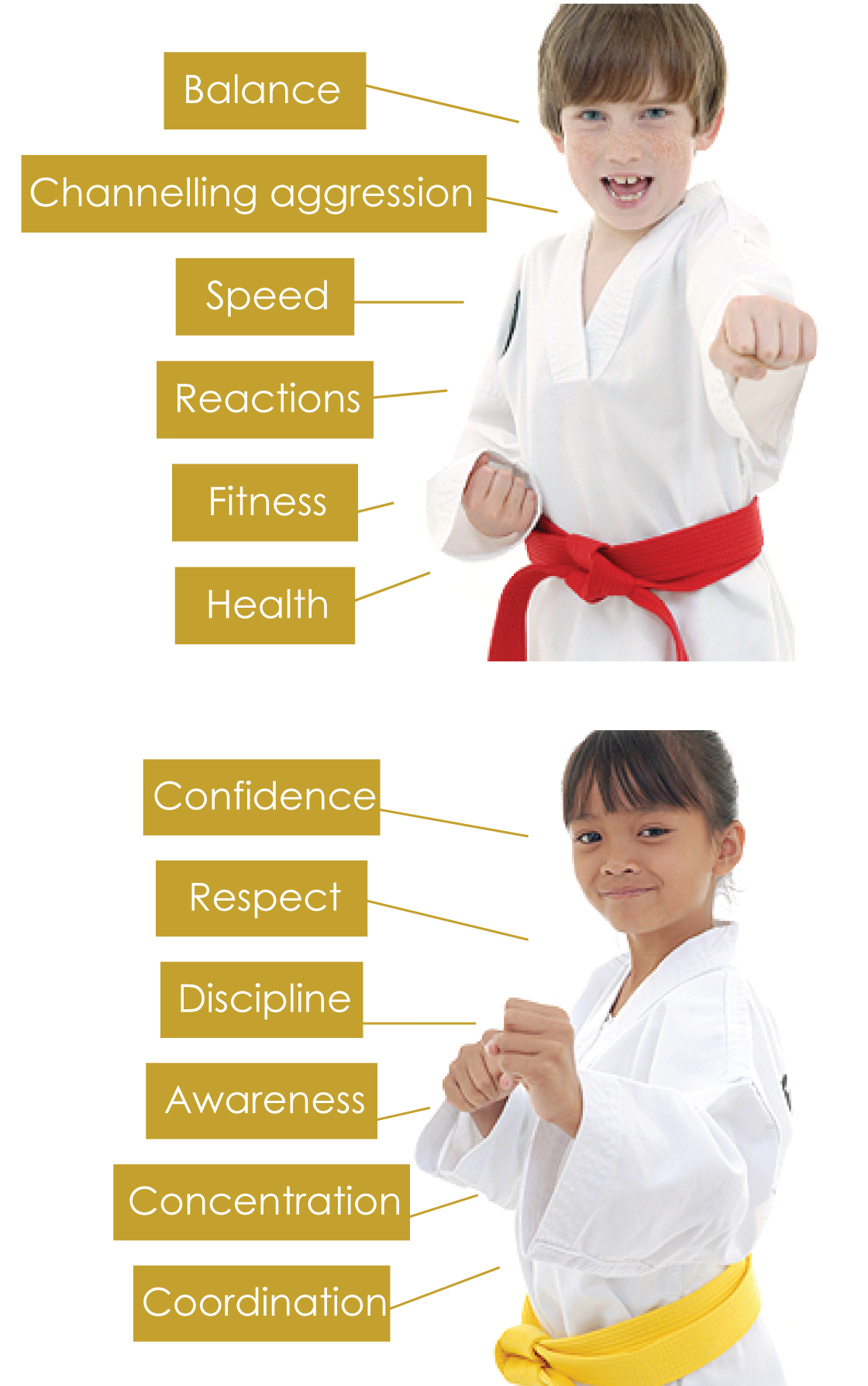What is Tae Kwon Do
Taekwon-Do is a version of unarmed combat designed for the purpose of self-defense.
Translated literally "Tae" stands for jumping or flying, to kick or smash with the foot. "Kwon" denotes the fist-chiefly to punch or destroy with the hand or fist. "Do" means an art or way - the right way built and paved by the saints and sages in the past.
Taken collectively "Taekwon-Do" indicates the mental training and the techniques of unarmed combat for self-defence as well as health, involving the skilled application of punches, kicks, blocks and dodges with bare hands and feet to the rapid destruction of the moving opponent or opponents.
Taekwon-Do is more than just that, however. Though it is a martial art, its discipline, technique and mental training are the mortar for building a strong sense of justice, fortitude, humility and resolve. It is this mental conditioning that separates the true practitioner from the sensationalist, content with mastering only the fighting aspects of the art.
Taekwon-Do also implies a way of thinking and life, particularly in instilling a concept and spirit of strict self-imposed discipline and an ideal of noble moral rearmament. This concept is one of the reasons why Taekwon-Do is not just another style of fighting but considered a true art of self-defense by its practitioners.


A Brief History

Gen. Choi established ITF-Taekwondo, which practices a more
traditional form of taekwondo, on March 22nd, 1966. WTF-Taekwondo
has a strong emphasis on sparring and became an olympic sport in
2000. Although similar, ITF is a way of life and a true martial
art. WTF is much more a martial sport due its singular focus on
sparring.
A good-will trip to North-Korea in 1966 caused General Choi to
fall in disgrace in the eyes of the South-Koreans. Choi resigned as
president of the K.T.A. and founded the I.T.F. on March, the 22nd
of that same year. The headquarters of ITF were established in
Canada.
ITF started concentrating on the forms developed by General
Choi, while the KTA (which later, on May 28, 1973, became the WTF)
concentrated on the Palgwe's. Later the WTF abandoned the Palgwe's
and started concentrating on Taeguks. Slowly, the WTF emphasis
turned to sparring. This is also the reason why a lot of people
rather call (WTF) Taekwondo a martial sport than a Martial Art.
The American Taekwondo Association (ATA) is a smaller
organization, and has many similarities to the ITF. The ATA has a
copyright on the forms of the organization, so these forms cannot
be used on competitions by non-members. There are many
organizations, but the three mentioned above have the most
members.
ITF focuses more on the traditional way of taekwondo. ITF
practices the so-called 'semi-contact' part of Taekwondo focusing
on control. WTF practices the so-called 'full-contact' part. In
practice both styles value vigorous sparring with full contact but
while WTF awards points for a knock outs ITF competition rules
explicitly prohibit them. Since the break-up of the two styles,
there have been many attempts to reunite WTF and ITF, so-far
without success.

Belt Colors

There are six belts: white, yellow, green, blue, red and black.
White is given to beginners and black is given to students who have
progressed through the grades and have a solid foundation for
learning the techniques of Taekwon-Do.
White Belt
 Signifies innocence, as that of the beginning
student who has no previous knowledge of Taekwon-Do.
Signifies innocence, as that of the beginning
student who has no previous knowledge of Taekwon-Do.
Yellow Belt
 Signifies the earth from which a plant
sprouts and takes root as the foundation of Taekwon-Do is being
laid.
Signifies the earth from which a plant
sprouts and takes root as the foundation of Taekwon-Do is being
laid.
Green Belt
 Signifies the plant's growth as Taekwon-Do skills
begin to develop.
Signifies the plant's growth as Taekwon-Do skills
begin to develop.
Blue Belt
 Signifies the Heaven towards which the plant matures
into a towering tree as training in Taekwon-Do progresses.
Signifies the Heaven towards which the plant matures
into a towering tree as training in Taekwon-Do progresses.
Red Belt
 Signifies Danger, cautioning the the student to
exercise control and warning the opponent to stay away.
Signifies Danger, cautioning the the student to
exercise control and warning the opponent to stay away.
Black Belt
 Opposite of white, therefore signifying the maturity
and proficiency in Taekwon-Do, also indicates the wearer's
imperviousness to darkness and fear.
Opposite of white, therefore signifying the maturity
and proficiency in Taekwon-Do, also indicates the wearer's
imperviousness to darkness and fear.
* Stay Physically Fit
Taking care of your body and staying fit is probably one of the
most important things you can do. While any excercise that promotes
cardio-vascular health and muscle strength is good, Taekwon-Do
offers several unique fitness advantages over lifting weights,
running the treadmill, and your aerobics class above and beyond the
pure self defense component of the sport.
* Build Lean Muscle Mass
Through highly repetitive, low resistance bodily
movements, Taekwon-Do builds a long, lean, flexible
musculature . The result is a lean, cardiovacularly fit, flexible
body with improved endurance and stamina.
* Get a Solid Core
One of the cornerstone principles of Taekwon-Do is the use of
torque to produce striking or kicking power. Nearly all the
movements in Taekwondo involve the twisting of some body part and
corresponding counter balance. For example, a simple punch involves
the twisting of both wrists and the trunk while counter balancing a
striking fist with the retraction of the opposite arm. This
emphasis on twisting the trunk in executing kicking movements and
in counterbalancing hand movements builds a trim, well-muscled
abdomen (core) and develops the side of the trunk and inner thigh
muscles. There are few, if any, excercises at the gym which will
build core strength faster than Taekwondo.
* Train Hard, Get Injured Less
Taekwon-Do does not require any weights or special equipment.
All you need is your own body weight. When you practice Taekwondo
you're slinging yourself about, not iron, to develop muscle tone,
cardio-vascular health and stamina. As you progress, you find that
your body sets its own limits and adjusts accordingly limiting
injury and strain. Your current level of physical fitness also acts
as an automatic pacing mechanism at first limiting what you can do,
then, as your fitness level improves, allowing you to perform
advanced techniques and participate in longer, more vigorous
training sessions.
* Lose Weight... Permanently!
Taekown-Do is a calorie killer plain and simple. It balances the
principles of aerobic excercise and interval training producing an
excercise regimen that burns fat, and builds lean muscle mass
extremely well. Your 180lb adult will burn over 800 calories an
hour during a vigorous Taekwondo workout.
Compare the calorie burning properties of different excercises
at Nutri-Strategy Activity List







